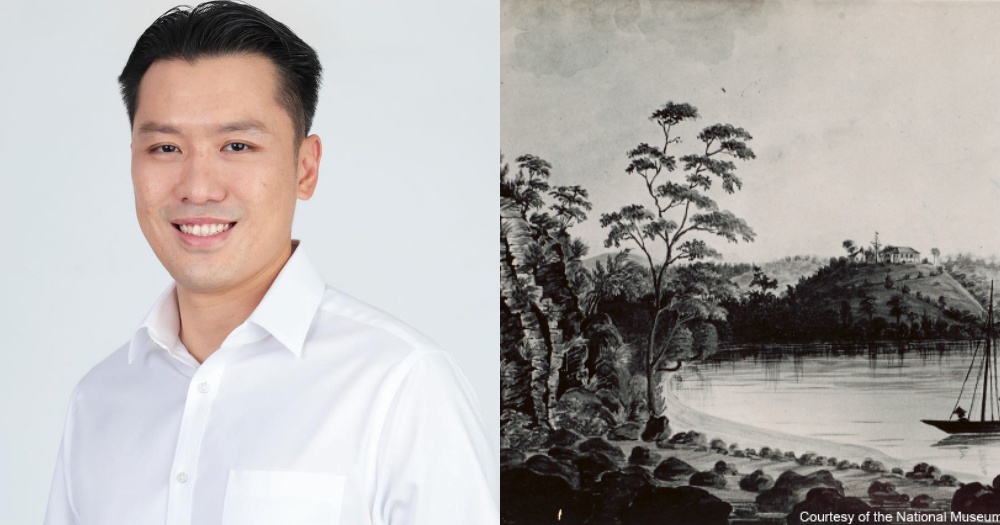Newly-elected Member of Parliament Shawn Huang brought Singaporeans through an exploration of Singapore's history in his maiden speech yesterday (September 4), starting with Temasek, the 13th century emporium that predated present day Singapore.
His speech touched on the need for Singapore to learn from past events in order to keep ourselves relevant.
Temasek faced challenges in the past
Just like Singapore today, Temasek as a port faced fierce competition during its time.
There was Lambri in the west (present-day Aceh), Langkasuka in the east, and Tambralinga in the north (present-day south Thailand).
Despite the competition, Temasek performed well in its fight for relevance and survival, said Huang.
"It did well by being part of sub-regional systems of economic exchange, between the peoples in the hills and coastal settlers, and by connecting these local and regional networks internationally."
Two settlements of people
Huang could have been referring to two distinct settlements of people believed to have inhabited 13th century Singapore.
One was a group living on the Forbidden Hill (present-day Fort Canning) while the other inhabited the shore at Dragon's Tooth Gate (the area at present-day Keppel/ Labrador Park).
The former was said to be "honest". They wore their hair short and sported turbans of gold-brocaded satin and red-coloured cloths.
The latter, on the other hand, was prone to bouts of piracy.
Temasek, Huang said, offered products that distinguished it from other ports, including:
"Top-quality hornbill casques, lakawood and cotton. I emphasise here — top quality."
"Hornbill casque, a highly sought after substitute for ivory, were found only in the Malay Peninsula, Temasek, Borneo and the Riau Archipelago. Lakawood was used as incense, a red dye and as a disinfectant."
Huang also pointed out that while lakawood was available in 19 other regional ports, only five (including Temasek) offered good quality lakawood.
Temasek's decline
Alas, Temasek's good fortune and prosperity did not last.
Its success attracted the attention of major powers in the region, such as Ayuttaya in the north and the Majapahits in present-day Java.
"According to some records, without the ability to defend herself, Temasek was brought under the influence of Ayutthaya and its revenue was forwarded to the court. Temasek was also overly-dependent on trade with the declining Yuan Dynasty in China."
A new port settlement at the Melaka River also diverted trade away from Temasek.
Furthermore, Temasek was beset by "internal conflicts that led to a foreign invasion dealt the final blow", said Huang.
What was this internal conflict that led to an invasion?
We guess that it is the Malay myth of bendahari (State Treasurer) Sang Ranjuna Tapa whose daughter was humiliated by Raja Secander Shah (Iskandar Syah).
According to the story, the king was enamoured with the beauty of the treasurer's daughter.
Jealous that the girl received so much attention from the king, the king's concubines plotted together and accused the girl of infidelity.
Enraged, the king ordered the girl to be impaled in the middle of a busy market.
Sang Ranjuna Tapa avenged his daughter by opening the gates of the fortified Singapura to the Javanese during a battle, allowing the enemies to storm the city and raze the kingdom of Singapura to the ground.
"Eventually, Temasek was ceded to Melaka in exchange for an annual payment of gold and swapped away like common chattel, with no control over its destiny. For the next hundred years. Temasek, became nothing more than a feeder port."
Parallels with old world
Huang went on to say that in this current Brave New World, these age-old threats have not disappeared but are supplanted by pandemics, discord, and climate change.
Singapore has to embrace the realities of this changing world, he said.
Huang said that to stay relevant, Singapore has to develop strong and deep relationships, operate as an ecosystem of differentiated capabilities (like Google and Alibaba), embrace the expectation of achieving mastery in what we do, and invest in the ever-evolving technology.
Lastly, Singaporeans also have to have a deep understanding of our national identity in order to stay relevant, said Huang:
"No empire, nation state or city state existed in the same form forever, and an important factor is distilling the essence of being Singaporean, such that the very core of who we are, does not wane and flow with the tides of time."
The relationship between Singaporeans has to be underpinned by "deep trust and mutual respect", he said.
"We will be relevant. We are constantly looking into the future but are well aware of our history. We are small, but courageous in our ambition. We are diverse but united in our cause."
If you like what you read, follow us on Facebook, Instagram, Twitter and Telegram to get the latest updates.
